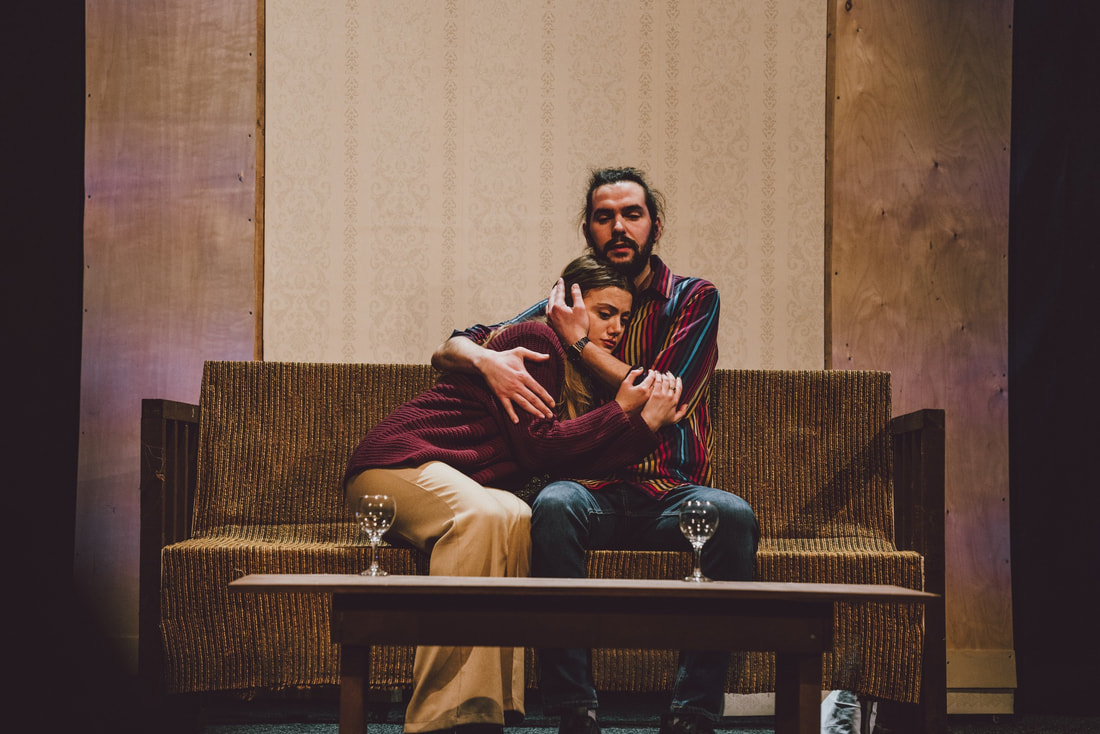Review by Manushaqe IbrahimiWritten and brought to life by Lirak Çelaj, Arbri draws its inspiration from the film 'The Father,' by French playwright and film-maker Florian Zeller. Not only did it bring to light the challenges that individuals face when dealing with dementia but also shed light on political social issues.
Throughout the performance, a significant emphasis was placed on repetition and changes in the setting, which to me appeared to serve as a metaphor for Arbri's gradual mental deterioration, masterfully portrayed by Shkumbin Istrefi. While the storyline engrosses the audience, a unique perspective emerges, as, at times, it's the daughter, the caretaker, and other characters who seem more bewildered than Arbri himself. This twist in perception underscores the notion that, often, to a person struggling with mental health problems, those who appear 'normal' may seem 'crazy.' This seems to be the director's intention—a mind game played on the audience rather than the characters. The show started with music, like a radio that interferes with frequencies and not one song would play until the end. Almost giving us a warning that nothing is stable with the main character. It felt a lot like a loop happening inside of the main character's head, like too many versions of realities shifting into each other, and him not being able to process any of them. You could see that in his reaction when Ana, his daughter would tell him that she’s going to live abroad. However, the time in which he points out that’s always the same serves as an anchor for him knowing that he’s still standing in one of those realities. The recurring time of 11:55 is accompanied by Arbër's fixation on his watch and his inquiries about the' watches of others, possibly hinting at the watch being a cherished gift from a loved one, possibly his "deceased" daughter or wife, whose existence still provokes me, though I find it quite smart that they were not present. This enigmatic aspect continues to engage the audience, leading to questions about the wife's status – is she alive or not? Furthermore, doubts arise about Lule, the absent daughter – is she truly deceased, a war veteran, or another manifestation of Arbër's imagination? Besides dealing with dementia as a sickness, the show really tried to highlight the troubles of relatives dealing with the condition, which, especially in Kosovo for some reason, remains a lingering stigma. To this day people feel ashamed telling others if someone in their family is suffering from this illness. Qëndresa Jashari, who portrayed Ana, Arbër's daughter, adeptly conveyed the numerous problems she grappled with while caring for her father, including issues that strained her personal relationships and the financial burdens that exacerbated the situation. An element that got stuck with me, was when Ana starts to drink wine with her significant other and then starts crying, capturing a perfect interpretation of her feeling as she’s losing control, trying to find a sparkle of hope that things will get better, but deep down she knows that the situation only gets worse. An important moment in the performance occurred when Arbri was admitted to a nursing home for the elderly and had an interaction with a nurse. This scene brought to mind a similar real-life incident that took place in Kosovo some time ago. While it initially seemed like Arbri might be starting to feel like a burden to others, this scene raised important questions regarding the effectiveness and ethical considerations of elder care facilities. As Arbri interacted with the nurse, it also exposed deeper, unresolved traumas, particularly related to the war. There were instances where he expressed anger in both Serbian and Turkish, suggesting that he was reliving certain unpleasant moments of his life. This situation prompts reflection on the numerous individuals who may be silently suffering from unaddressed traumas because they ignore the symptoms simply because of what people may think of them. These roles were executed exceptionally by the actors portraying them, however while the role of Petrit/Agron, portrayed by Labinot Raci, at times felt somewhat contrived. Nonetheless, I feel like his character was intentionally designed not to be universally likable, and it presented a challenging role to perform. Also, the play addressed a wider social-political issue when Ana sought financial assistance, citing her father's military service and the fact that he was the father of a fallen soldier. The response, "So what, are we supposed to give all the funds and money to them?" drew attention to the unsettling treatment of veterans and war invalids. The ensemble of actors delivered a cohesive performance that harmoniously followed the narrative's rhythm. The play's dynamism is enhanced by the flexibility of scenography, which makes efficient use of props. The clever injection of humor, addressing profound societal issues without making the audience uncomfortable, adds to the play's appeal. These moments of humor resonate with the everyday jokes that many of us have heard from our own fathers and grandfathers. Nevertheless, it's crucial to remember that the underlying theme is not a jest; it pertains to an illness that demands greater awareness, understanding of its symptoms, and increased support for those affected. Credits: Text/director: Lirak Çelaj Cast: Shkumbin Istrefi, Qëndresa Jashari, Labinot Raci, Daniela Markaj, Blend Sadiku Stage: Burim Arifi Lighting: Yann Perregaux Dielf, Bujar Bekteshi
0 Comments
Leave a Reply. |
Kosovo Theatre ReviewsReviews and creative responses to theatre productions in Kosovo Archives
November 2022
Categories |

 RSS Feed
RSS Feed
